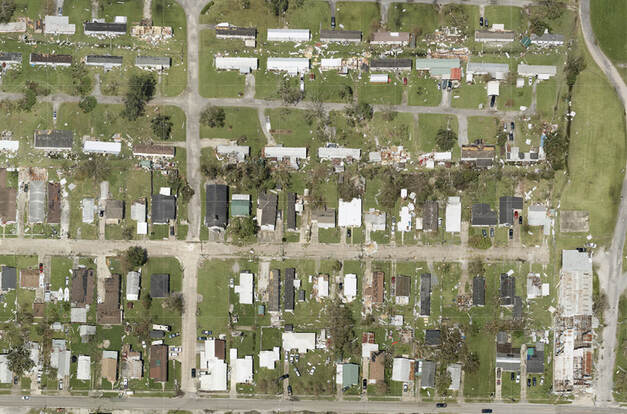|
Photo: Aerial photo shows damage in Houma, Louisiana following Hurricane Ida. Credit — National Oceanic and Atmospheric Administration’s National Geodetic Survey Hurricane Ida has ravaged states from Louisiana through New England this week, leaving horrific damage and death in its wake. At least five of the states that Ida visited had tornadoes touch down, with Pennsylvania experiencing a total of 16 tornado warnings. The storm left masses of people without power. Over one million people in Louisiana are experiencing outages, and officials predict that it will take a number of weeks for the grid to be restored. Power outages are impacting communities all along Ida’s path, with Mississippi reporting over 86,000 households without electricity, New Jersey reporting over 57,000, Connecticut over 37,000, and Pennsylvania over 18,000. Electricity isn’t the only resource impacted — many in Louisiana are experiencing downed cellular and water systems services, as well as fuel and oxygen shortages. There have been discharges of untreated sewage in Connecticut, and in parts of Virginia at least 20 homes were moved from their foundations. Virginia officials expect it to take 30 days to restore power, and a year for public water to be fully restored. In Mississippi, where they are reported to have avoided the worst of the storm, a highway collapsed as a result of heavy rains from Ida, leaving two people dead and several others injured. The final death toll is unknown as flood waters throughout the Northeast continue to present a danger, but from Maryland to New York there have been at least 22 deaths reported in addition to seven reported throughout Louisiana, Mississippi and Alabama. As with everything under capitalism, the devastation and outcomes of a catastrophe like Ida are not equally felt. In New York City, for example, eight people died in flooded basement apartments, which are often less expensive and house lower income individuals and families. Working class people are often unable to afford to evacuate before or during dangerous weather events or don’t have anywhere to evacuate to, leaving them forced to remain in their homes when these disasters hit. For those who are able to evacuate, often they are relocated to a small, enclosed and overcrowded location. This is less than ideal in the best of times, but in the midst of a pandemic can be potentially deadly. In contrast, the wealthy are able to relocate themselves with relative ease should the need arise, and have no need to rely on public storm shelters. For those who cannot afford or do not have access to a generator, widespread power outages cause dangerous conditions in the heat, especially in places where temperatures are climbing to 90+ degrees. Extended periods of time without power can also result in the loss of safe food and water. There are further inequalities in terms of ability to stay safe and out of the storm. As has been starkly highlighted throughout the pandemic, many low-wage workers are also considered to be “essential”, and so during a catastrophic event may still be expected to go to work. If they do not then they risk losing their jobs. Alternately, for working class people who do stay home, that may result in a critical loss of income. Another striking contrast is in the ability to rebuild following a disaster such as Ida. Many members of the working class do not have the means to make needed repairs to their homes, or to rebuild entirely should their home be destroyed. They may end up being forced to move, become homeless, or remain and live in an unsafe situation. As the climate crisis caused and fueled by capitalist greed worsens, and disasters like Hurricane Ida become more frequent and widespread, the discrepancies and inequalities are set to become sharper. The rich remove themselves from the realities of the changing and deteriorating climate, while leaving the rest of us to face the consequences of their actions. Capitalism is not only unable to solve the climate crisis, but it is also unable to appropriately address the disasters that are occurring with increased frequency as a result. Socialism is needed in order to both confront the climate disaster, and to deal with natural disasters in a way that prioritizes and protects human life. AuthorKenya Elliott This article was produced by Liberation News. Archives September 2021
0 Comments
Leave a Reply. |
Details
Archives
July 2024
Categories
All
|

 RSS Feed
RSS Feed